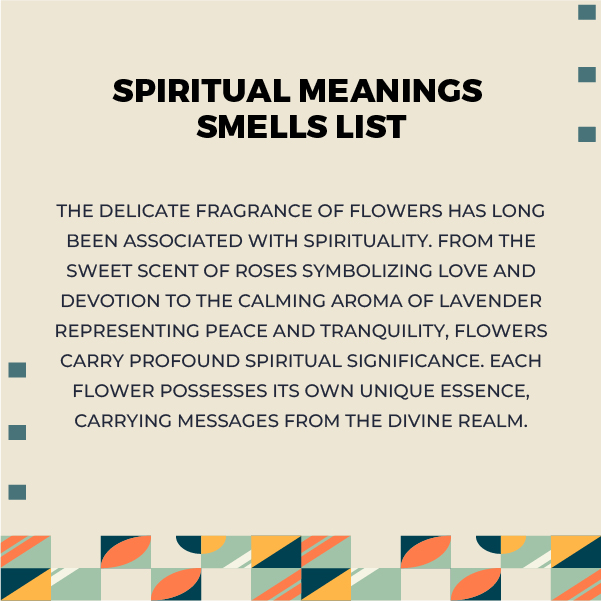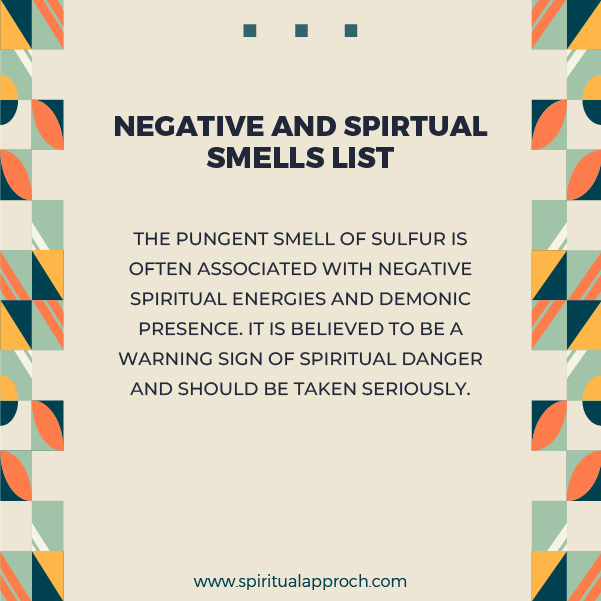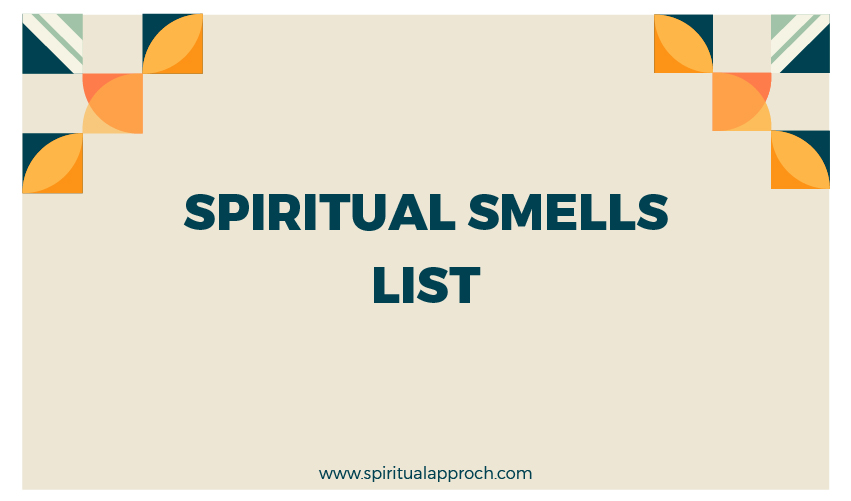Welcome to a fascinating exploration of spiritual smells, where we delve into the realm of the senses and uncover the hidden meanings behind various olfactory experiences. Our sense of smell is a powerful tool that can connect us to the spiritual world, offering insights, warnings, and guidance. In this article, we will take you on a journey through the Spiritual Smells List, including positive and negative scents, Christian associations, the enchanting aroma of cinnamon, and the profound meanings behind these spiritual fragrances. Prepare to be captivated by the mysteries that lie within the realm of spiritual smells.
Spiritual Smells List:
- Flowers: The delicate fragrance of flowers has long been associated with spirituality. From the sweet scent of roses symbolizing love and devotion to the calming aroma of lavender representing peace and tranquility, flowers carry profound spiritual significance. Each flower possesses its own unique essence, carrying messages from the divine realm.
- Incense: The burning of incense has been a sacred practice in many cultures for centuries. The rich, aromatic smoke wafting through the air is believed to purify the environment and create a sacred space for spiritual rituals. Different types of incense, such as frankincense, myrrh, and sage, are associated with specific spiritual intentions, such as protection, healing, and meditation.
- Rain: The earthy scent of rain after a long dry spell is often described as refreshing and rejuvenating. In spiritual contexts, rain is seen as a symbol of cleansing and renewal. It is believed to wash away negative energies, bringing forth a sense of spiritual purity and new beginnings.
- Burning Candle: The warm glow and gentle fragrance of a burning candle have a profound impact on our spiritual experiences. Candles are often used in religious ceremonies and rituals to create an atmosphere of reverence and connection with the divine. The scent of a candle can evoke feelings of peace, serenity, and spiritual illumination.
- Sacred Woods: The aroma of sacred woods, such as sandalwood and cedar, holds deep spiritual significance in various traditions. These woods are often used in rituals and ceremonies to purify the space and enhance spiritual connections. The earthy, grounding scents of sacred woods can help us feel centered, protected, and connected to the spiritual realm.
To Explore More Spiritual Meanings: Guide To Understand The Spiritual Candle Flame Meaning

Positive Spiritual Smells List:
- Vanilla: The sweet, comforting scent of vanilla is associated with feelings of joy, love, and comfort. It is believed to attract positive energy and promote a sense of well-being and relaxation.
- Citrus: The invigorating aroma of citrus fruits, such as oranges and lemons, is known to uplift the spirit and promote positivity. Citrus scents are often used to cleanse and purify the energy around us, bringing a sense of freshness and vitality.
- Jasmine: The intoxicating fragrance of jasmine is often associated with love, sensuality, and spiritual awakening. It is believed to enhance spiritual connections and open the heart chakra, allowing for deeper emotional and spiritual experiences.
- Rosemary: The herbaceous scent of rosemary is known for its purifying and protective properties. It is believed to clear negative energies, promote mental clarity, and enhance spiritual awareness.
- Pine: The crisp, refreshing scent of pine is often associated with the holiday season and feelings of peace and harmony. It is believed to promote spiritual growth, grounding, and a deeper connection with nature.
To Explore More Spiritual Meanings: Burning Hair Spiritual Meaning What Does It Mean? [Explained]
Negative Spiritual Smells List:
- Sulfur: The pungent smell of sulfur is often associated with negative spiritual energies and demonic presence. It is believed to be a warning sign of spiritual danger and should be taken seriously.
- Rotten Eggs: The foul odor of rotten eggs is considered a negative spiritual smell, indicating the presence of negative energies or entities. It is often associated with malevolent spirits or the influence of dark forces.
- Decay: The smell of decay, such as rotting flesh or decaying matter, is a potent symbol of spiritual stagnation and decay. It signifies the need for spiritual cleansing, renewal, and letting go of negative attachments.
- Burning Hair: The acrid smell of burning hair is often associated with negative spiritual experiences, such as curses or hexes. It is believed to be a sign of spiritual attack or interference.
- Mold: The musty, damp smell of mold is often associated with stagnant energy and unhealthy environments. It is a warning sign to address any spiritual or energetic imbalances and create a space of cleanliness and positivity.
To Explore More Spiritual Meanings: Decoding The Spiritual Symbolism Behind Preauricular Pit Myths

Spiritual Smells Christian List:
- Frankincense: Frankincense holds deep significance in Christian traditions and is often associated with sacred rituals and ceremonies. Its rich, resinous scent represents the presence of the divine and is believed to enhance spiritual connections and prayer.
- Myrrh: Myrrh, another precious resin, is closely linked to the story of Jesus’ birth. Its earthy, balsamic fragrance symbolizes sacrifice, healing, and spiritual transformation.
- Lilies: Lilies are often mentioned in the Bible and hold spiritual significance in Christianity. Their sweet, delicate scent represents purity, innocence, and the resurrection of Christ.
- Cedarwood: Cedarwood is mentioned numerous times in the Bible and is associated with strength, protection, and spiritual grounding. Its woody aroma is believed to create a sacred space for prayer and meditation.
- Spikenard: Spikenard, a fragrant oil mentioned in the New Testament, is associated with acts of devotion and worship. Its exotic scent represents love, humility, and the anointing of Jesus.
To Explore More Spiritual Meanings: Exploring The Perfect Spiritual Upside Down Triangle Symbol
List of Spiritual Smells Cinnamon:
- Warmth and Comfort: The spicy, inviting scent of cinnamon evokes feelings of warmth, comfort, and home. It is often associated with the holiday season and spiritual celebrations, creating a cozy and welcoming atmosphere.
- Abundance and Prosperity: Cinnamon is believed to attract abundance and prosperity into our lives. Its sweet, aromatic fragrance is associated with wealth, success, and the manifestation of desires.
- Energizing and Stimulating: The invigorating scent of cinnamon can uplift the spirit, increase energy levels, and stimulate mental clarity. It is often used in spiritual practices to enhance focus, motivation, and productivity.
- Protection and Purification: Cinnamon is known for its protective and purifying properties. Its spicy aroma is believed to ward off negative energies, cleanse the environment, and create a shield of spiritual protection.
- Love and Passion: Cinnamon is associated with love, passion, and sensuality. Its warm, spicy scent can ignite feelings of desire, deepen emotional connections, and enhance romantic experiences.
To Explore More Spiritual Meanings: Unlocking The Spiritual Meaning Of Broken Glass
Spiritual Smells List and Their Meanings:
- Lavender: The soothing scent of lavender is associated with relaxation, peace, and spiritual healing. It is believed to calm the mind, promote restful sleep, and enhance spiritual connections.
- Patchouli: Patchouli has a rich, earthy aroma that is often used in spiritual practices to ground and center the self. It is believed to promote spiritual growth, balance emotions, and attract positive energy.
- Sage: The cleansing scent of sage is widely used in spiritual rituals to purify the energy around us. It is believed to remove negative energies, clear the mind, and create a sacred space for spiritual practices.
- Peppermint: Peppermint has a refreshing, invigorating scent that can awaken the senses and promote mental clarity. It is often used in spiritual practices to enhance focus, concentration, and spiritual awareness.
- Ylang-Ylang: Ylang-ylang has a sweet, floral fragrance that is associated with sensuality, joy, and spiritual awakening. It is believed to open the heart chakra, promote emotional healing, and deepen spiritual connections.

My Opinion:
In exploring the realm of spiritual smells, we have uncovered a world of hidden meanings and profound connections. Our sense of smell can serve as a powerful tool for spiritual growth, guidance, and self-discovery.
Whether it’s the enchanting aroma of flowers, the sacred smoke of incense, or the comforting scent of vanilla, each fragrance carries its own unique message from the spiritual realm. By paying attention to these spiritual smells and their meanings, we can deepen our understanding of ourselves, our surroundings, and the divine presence that surrounds us.
To further explore the fascinating world of spiritual meanings and experiences, visit our website for a wealth of resources, articles, and insights. Unlock the mysteries that lie within the realm of spiritual smells and embark on a transformative journey of self-discovery and spiritual growth.
